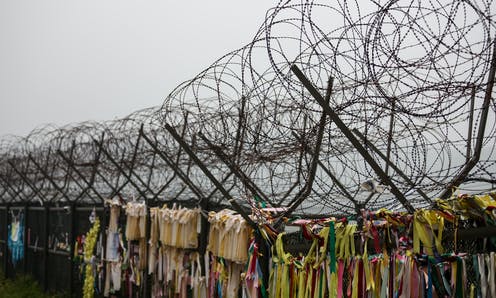The re-defection of a North Korean refugee, who had spent two years in South Korea after escaping the repressive communist country in 2020 before returning north on January 1, has shone a spotlight on the discrimination many northerners face in the richer and more sophisticated south.
The defector has been identified as a 29-year-old former gymnast, Kim Woo-joo. Kim crossed the 2.5 mile heavily protected demilitarised zone and scaled 10ft barbed-wire barriers to cross into the south in November 2020. He told South Korean officials he had defected to escape an abusive stepfather. Changing his name to Kim Woo-jeong, he reportedly found work as an office cleaner. But just over a year later he appears to have made the same dangerous journey in reverse. This has prompted speculation he might have been a spy, something denied by government officials.
Many North Koreans escape their harsh lives in the DPRK, where poverty and famine are widespread and human rights violations by the authorities are routine. About 300,000 North Koreans have escaped and moved to various countries worldwide since the end of the conflict on the Korean peninsula in 1953 and about 30,000 settled in South Korea.
It is rare for defectors to return to North Korea – there were about 30 in the past decade. But it is well known that many North Koreans miss their families and life in the DPRK despite the hardships – and many struggle to adapt to life in the South.
North Koreans fleeing to the South receive government support to begin with. On arrival in South Korea, refugees from the North seeking citizenship and residence attend classes to prepare them for their new lives. These “Hanawon” (house of unity) as they are called, last for 60-75 days and are widely thought of as inadequate to equip refugees from the North for even very low level employment in the South.
The refugees (saetomin or “new settlers”) are allocated their first place of residence by the government (often outside Seoul) and from then on are effectively on their own. They often find it very hard to make a good living in the South. Despite being a dynamic free market democracy, success depends on a system of informal connections. These tend to be based on regional origins and graduation from certain educational institutions. It’s a hierarchical old boys network known as hakyeon-jiyeon into which escapees from the North have a hard time fitting.
Looking for a future
Many refugees come from the northern provinces of the DPRK and are mostly manual workers or farmers with a very poor level of education. So the earnings they can achieve in the South are often too little to live properly. In 2019 a defector and her young son died in Seoul – apparently of starvation.
North Korean refugees not only suffer from social stigma, but experience mistreatment, suspicion and discrimination from many southerners. This can result in profound alienation and puts them at risk of mental health illnesses. It’s a cycle of despair which makes it hard to understand their situation and obtain help – making it more difficult to secure a decent living.
About 80% of the North Korean defectors in South Korea are female. Many of these women, who typically suffer from discrimination by employers and have difficulty in accessing social services, are forced into prostitution. There have been reports that many employers in the South are suspicious of persons with North Korean accents.
Meanwhile, North Korean children often face rejection and sometimes bullying at school in the South. At the other end of the scale, older escapees face destitution because they are unable to access South Korea’s “defined benefit” pension scheme, which is based on contributions over the working life of a person. If a refugee close to retirement age has not made any contributions, on retirement he or she will be entitled to the basic old age pension that provides a maximum of KRW204,010 (£137) per month. Poverty in old age is a serious problem in the South which disproportionately affects North Koreans, given their situation.
Moving on, moving back
A significant population of North Koreans do not stay in the South and instead travel on to Europe and the United States rather than face the hardships of trying to integrate into South Korean society.
Others return North, despite the hardships of life under the repressive government, the severe human rights violations and the risks such a return could entail. One defector, who was being prevented from returning North by the Seoul government, told The Guardian in 2018:
North Korean defectors are forever strangers in this country, classified as second class citizens. I would never want my daughter to live this life. North Korean defectors are treated like cigarette ashes thrown away on the streets.
The fate of North Koreans in the South has echoes of the experience of people from the former East Germany, where they faced discrimination and often poverty after reunification. But East Germans did not have to risk their lives and leave their families behind. And the economic and cultural gaps between East and West Germany were not as wide as those between North and South Korea.
Korean unification may come some day in the future – but until then many hurdles will have to be overcome.
![]()
Christoph Bluth received funding from the Korea Foundation.











